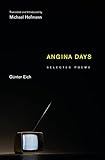Angina Days : Selected Poems / Günter Eich.
Material type: TextSeries: Facing PagesPublisher: Princeton, NJ : Princeton University Press, [2010]Copyright date: ©2010Edition: Course BookDescription: 1 online resource (224 p.)Content type:
TextSeries: Facing PagesPublisher: Princeton, NJ : Princeton University Press, [2010]Copyright date: ©2010Edition: Course BookDescription: 1 online resource (224 p.)Content type: - 9780691144979
- 9781400834341
- 831/.914 22
- PT2609.I17
- online - DeGruyter
- Issued also in print.
| Item type | Current library | Call number | URL | Status | Notes | Barcode | |
|---|---|---|---|---|---|---|---|
 eBook
eBook
|
Biblioteca "Angelicum" Pont. Univ. S.Tommaso d'Aquino Nuvola online | online - DeGruyter (Browse shelf(Opens below)) | Online access | Not for loan (Accesso limitato) | Accesso per gli utenti autorizzati / Access for authorized users | (dgr)9781400834341 |
Frontmatter -- Contents -- Acknowledgments -- Introduction -- from Abgelegene Gehöfte/Remote Smallholdings (1948) -- from Botschaften des Regens/Messages from the Rain (1955) -- from Zu den Akten/Ad Acta (1964) -- from Anlässe und Steingärten/Occasions and Rock Gardens (1966) -- Nach Seumes Papieren/From Seume's Papers (1972) -- from Uncollected Poems and Poems from Radio Plays
restricted access online access with authorization star
http://purl.org/coar/access_right/c_16ec
This is the most comprehensive English translation of the work of Günter Eich, one of the greatest postwar German poets. The author of the POW poem "Inventory," among one of the most famous lyrics in the German language, Eich was rivaled only by Paul Celan as the leading poet in the generation after Gottfried Benn and Bertolt Brecht. Expertly translated and introduced by Michael Hofmann, this collection gathers eighty poems, many drawn from Eich's later work and most of them translated here for the first time. The volume also includes the original German texts on facing pages. As an early member of "Gruppe 47" (from which Günter Grass and Heinrich Böll later shot to prominence), Eich (1907-72) was at the vanguard of an effort to restore German as a language for poetry after the vitriol, propaganda, and lies of the Third Reich. Short and clear, these are timeless poems in which the ominousness of fairy tales meets the delicacy and suggestiveness of Far Eastern poetry. In his late poems, he writes frequently, movingly, and often wryly of infirmity and illness. "To my mind," Hofmann writes, "there's something in Eich of Paul Klee's pictures: both are homemade, modest in scale, immediately delightful, inventive, cogent." Unjustly neglected in English, Eich finds his ideal translator here.
Issued also in print.
Mode of access: Internet via World Wide Web.
In English.
Description based on online resource; title from PDF title page (publisher's Web site, viewed 29. Jul 2021)


